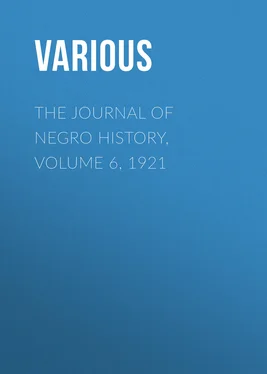Various - The Journal of Negro History, Volume 6, 1921
Здесь есть возможность читать онлайн «Various - The Journal of Negro History, Volume 6, 1921» — ознакомительный отрывок электронной книги совершенно бесплатно, а после прочтения отрывка купить полную версию. В некоторых случаях можно слушать аудио, скачать через торрент в формате fb2 и присутствует краткое содержание. Жанр: foreign_antique, periodic, История, foreign_edu, на английском языке. Описание произведения, (предисловие) а так же отзывы посетителей доступны на портале библиотеки ЛибКат.
- Название:The Journal of Negro History, Volume 6, 1921
- Автор:
- Жанр:
- Год:неизвестен
- ISBN:нет данных
- Рейтинг книги:4 / 5. Голосов: 1
-
Избранное:Добавить в избранное
- Отзывы:
-
Ваша оценка:
- 80
- 1
- 2
- 3
- 4
- 5
The Journal of Negro History, Volume 6, 1921: краткое содержание, описание и аннотация
Предлагаем к чтению аннотацию, описание, краткое содержание или предисловие (зависит от того, что написал сам автор книги «The Journal of Negro History, Volume 6, 1921»). Если вы не нашли необходимую информацию о книге — напишите в комментариях, мы постараемся отыскать её.
The Journal of Negro History, Volume 6, 1921 — читать онлайн ознакомительный отрывок
Ниже представлен текст книги, разбитый по страницам. Система сохранения места последней прочитанной страницы, позволяет с удобством читать онлайн бесплатно книгу «The Journal of Negro History, Volume 6, 1921», без необходимости каждый раз заново искать на чём Вы остановились. Поставьте закладку, и сможете в любой момент перейти на страницу, на которой закончили чтение.
Интервал:
Закладка:
Briefly stated, the author covers a little better than usually the field in which many others have recently written. There appears the aftermath of the Rebellion, then the drama of Reconstruction followed by national development making possible a new era, the changing order, the revival of the Democratic Party, hard times, free silver, troubles with Spain, imperialism, Roosevelt and the Panama Canal, the New West, Progressivism, the "New Freedom," "Watchful Waiting," the World War, and the Peace Conference. The book is well illustrated with useful maps showing the West in 1876, the Cuba and Porto Rican campaigns, the Philippines, Mexico, West Indies, and Central America, the percentage of foreign-born whites in the total population in 1910, the percentage of Negroes in the total population in 1910, the Western Front in 1918, and the United States in 1920.
Discussing thus a period during which the most important problems before the American people has been how to segregate the Negroes within the law, the author touched here and there the so-called Negro question. While Dr. Haworth has not shown all of the breadth of mind expected in an historian he has been much more liberal than the pseudo-historians who endeavor merely to justify the proscription of the freedmen on the basis of so-called racial inferiority. Dr. Haworth does occasionally mention a Negro as having said or done something worthy of notice. In the average Reconstruction history there is no personal mention of the Negro except for the purpose to condemn him and to advise him how to make himself acceptable to his so-called superiors.
In his last chapter which he calls "A Golden Age in History" he says some things which we do not find in the works of the would-be historians of this period. On page 509 he writes: "A historian ought not to suppress uncomfortable facts, and it is undeniable that the treatment of the Negroes forms a blot on America's fair name. In parts of the South they are kept in a state of practical serfdom; in all cities they are herded into unsanitary districts; they are denied equal opportunities for advancement; and not infrequently they are maltreated and murdered by brutal mobs. It is true that individual Negroes, by fiendish assaults on white women, now and then rouse men to frenzy, but statistics show that only about a fifth of the lynchings of Negroes are because of the 'usual crime.' Burning at the stake is never justifiable under any circumstance, and it is undeniable that in race riots scenes of horror have been enacted that are a disgrace to American civilization. Such scenes are sadly out of place in a nation that proclaims itself the special champion of liberty and justice and which enlists in a crusade 'to make the world safe for democracy.'"
The American Colonization Society, 1817-1840. By Early Lee Fox, Ph.D., Professor of History in Randolph-Macon College. Baltimore. The John Hopkins Press, 1919. Pp. viii, 231.
This is another study made under the direction of the Johns Hopkins University faculty of Historical and Political Science and like many others of this order lies in the field of southern history and is written from the ex parte point of view. It does not cover the whole history of the American Colonization Society but restricts itself to that period when it was largely a southern enterprise primarily interested in getting rid of the Negro. Throughout the story there is too much effort to evade eloquent facts, too much effort to excuse the sins of the South by showing that the North itself was once slaveholding and slavetrading. On the whole, however, the author has in the use of such valuable material as the manuscripts and especially the letters of the American Colonization Society brought to light significant facts which the historian will be glad to use more advantageously.
After a brief introduction the book treats of the free Negro and the slave. Then comes the chapter on the organization, purpose, and early record of the Society. Attention is next directed to the conflict between the colonizationists and the abolitionists. Colonization is afterward discussed in connection with emancipation and finally with the African slave trade. Throughout the whole treatise there is a defense of the "lofty" motives of the men who labored so hard for the expatriation of the Negroes. As the author sees it, although the Society did not send many Negroes to Africa, it was after all a success; for it had a bearing on the emancipation of slaves, and on the suppression of the African slave trade. Abolitionists, attacking this undertaking based upon national sentiment, were endangering the union by their propaganda founded upon sectional sentiment. Colonization, therefore, was just because it was "born out of a desire to unite the North and the South in the settlement of the Negro problem." The purpose of the treatise then is to (page 127) "set forth the true aims of orthodox Colonizationists, or from another point to demonstrate that their aims were as sincerely expressed as sound policy would admit, and that, where motives were concealed, they were concealed in order to secure the freedom of the slaves."
Written from this point of view the dissertation becomes too much of a polemic to be accepted as a scientific treatise. Too much space is devoted to the task of unifying the widely different views of the colonizationists, too much effort is made to contrast the methods of the colonizationists with those of the abolitionists. The author does not seem to realize or at least fails to admit that the abolitionists were radical reformers seeking to eradicate the cause of social disease whereas the colonizationists were merely treating the symptoms of the malady in undertaking the impossible task of transplanting a whole race.
The general argument of the author in favor of the beneficence of colonization is not convincing. There is no authority for the contention that colonization promoted emancipation when the records show that the majority of slaveholders who supported it had in mind the expatriation of the free Negroes who among the bondmen were a living testimony against slavery. To say that colonization might check the slave trade by establishing one small colony in Africa is about as unsound, contended some free Negroes in 1831, as to argue that "a watchman in the city of Boston would prevent thievery in New York; or that the custom house officers there would prevent goods being smuggled into any other part of the United States." It is an insult to the intelligence of men who have seriously considered history to say that colonization was so built upon national sentiment as to have a direct bearing on the preservation of the Union when the colonizationists differed widely among themselves in the very beginning and finally divided just as the abolitionists, who at one time had also a national standing, in that most anti-slavery societies were once found in the South. Until Negro history, therefore, has been removed from the hands of those using it to whitewash their ancestors the world must still lack knowledge as to how the progress of mankind has been influenced by the Negro.
The Voice of the Negro. By Robert T. Kerlin, Professor of English at the Virginia Military Institute. New York, E. P. Dutton and Company, 1920. Pp. xii, 188.
The purpose of this book may best be expressed in the words of the author himself, when he says, in the preface: "The following work is a compilation from the colored press of America for the four months [July 1st to November 1st, 1919] immediately succeeding the Washington riot. It is designed to show the Negro's reaction to that and like events following, and to the World War and the discussion of the Treaty. It may, in the Editor's estimation, be regarded as a primary document in promoting a knowledge of the Negro, his point of view, his way of thinking upon race relations, his grievances, his aspirations, his demands." A book of such purport, especially when coming from the pen of a white man, must attract attention, and if the newspapers and periodicals from which the various extracts are chosen may be called truly representative, as in this case they are, the compiler has performed a distinct service in the field of American History.
Читать дальшеИнтервал:
Закладка:
Похожие книги на «The Journal of Negro History, Volume 6, 1921»
Представляем Вашему вниманию похожие книги на «The Journal of Negro History, Volume 6, 1921» списком для выбора. Мы отобрали схожую по названию и смыслу литературу в надежде предоставить читателям больше вариантов отыскать новые, интересные, ещё непрочитанные произведения.
Обсуждение, отзывы о книге «The Journal of Negro History, Volume 6, 1921» и просто собственные мнения читателей. Оставьте ваши комментарии, напишите, что Вы думаете о произведении, его смысле или главных героях. Укажите что конкретно понравилось, а что нет, и почему Вы так считаете.












